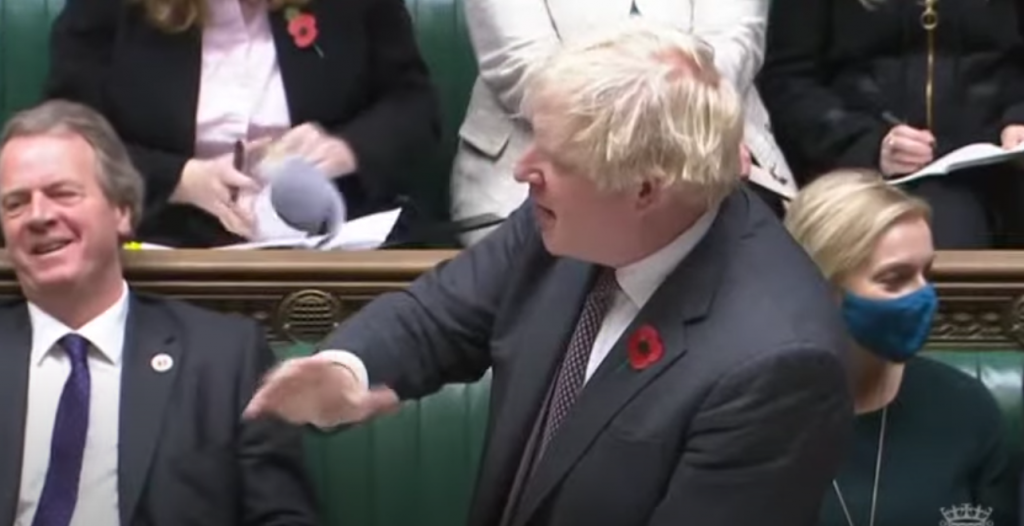Honourable Members?

“The louder he talked of his honour, the faster we counted our spoons“. Such might be the reaction to the Prime Minister’s assertion this week that Britain was “not remotely a corrupt country” and that he did not believe that “our institutions are corrupt“. Mandy Rice-Davies’ response comes to mind. Still, there is something impressive in the way he asserted that MPs breaking the rules should be investigated and punished barely days after having whipped his MPs into voting for the precise opposite for the errant Mr Paterson. That really is taking his famous lack of attention to detail to another level. But here we are. Less than a month after the murder of Sir David Amess, an MP whose hard work, openness and devotion to his constituents reminded us both of the price of public service and the good it can do, the Tory party is once again facing accusations of sleaze, corruption, favours for money, using public office for private gain and a de haut en bas disregard for the rules. It is all wearily familiar. How can we be going through this again despite all the changes in rules, the Nolan Principles for public life, the Commissioners, the Registers etc?
In truth there are a lot of concerns being conflated under the heading “sleaze“. What an MP who is also a QC gets paid and who his clients are may be deeply annoying but raises very different issues to an MP paid by a company to lobby on its behalf or vote through a measure benefiting it. The usual response to these stories is to demand an after-the-event investigation and/or a change to the rules. But perhaps we are looking at this in the wrong way.
What is the mischief we want to avoid?
Simple to say. The use of public office for private gain. That is not what becoming an MP should be for. It is this which leads to conflicts of interest, to the perception and, in some cases, the reality of MPs being bought by private interests. MPs can, probably should, have causes, interests, bees in their bonnet, enthusiasms, injustices they want to rectify, matters they want to bring to the country’s attention. That is what their salary is for. There is no need for them to be paid by any body to do so. Speaking, lobbying on behalf a cause, companies, groups, their constituents is the job. Being paid additional sums introduces an unnecessary element – a 3rd person in the marriage – which raises a question rarely asked – and even more rarely answered: “What service from the MP is this company/charity/organization paying for?” Money distorts the relationship between an MP and Parliament. Is he saying what he is because he believes it or because he is being paid to do so? A Register of Interests and transparency try to address this. But it would be better not to be in the position where motives are – or may be – in question. MPs are, after all, not being asked to do anything pro bono publico (the very idea!) but in return for their salary. Much like the rest of the working population, in fact. If they want tips, they can become waiters.
So no second jobs then? Ah, but there is another mischief frequently complained about: MPs with little or no experience of the world outside politics. And how will those with skills and knowledge and experience be persuaded to stand if they cannot use or keep those skills up-to-date? It is a fair question. There is no job security for MPs. Some roles – the law officers, for instance, demand lawyers of some repute.
So – should MPs have outside business interests? And, if so, what? One answer to this is to say that those skills, trades, professions which MPs had before they became MPs are the only ones they should be allowed practise after becoming MPs, subject to limitations – say, no more than a certain number of hours, or an upper limit on earnings or no more than 2 such business interests. The test should be: Would the MP have got this work, this contract if he were not an MP? If no, he does not take it.
Ah, but who is to judge? As Owen Paterson showed, MPs will convince themselves of whatever they need to in order to hang on to a lucrative sideline and their own belief in the purity of their motives. And if it is politically convenient, party leaders and whips will support them. So here’s an idea – standard in the Outside Business Interests policies at places I’ve worked.
- Have a policy on Outside Business Interests
- Base it on best practice in the private sector, with which MPs so often plaintively compare themselves.
- Let it set out what outside business interests may be permissible and on what grounds provided approval is obtained in advance from an independent Commissioner. He or she will need steel, good judgment, courage and a rhino’s hide.
- Take the final decision away from the MP or his/her party leader or colleagues. (If there needs to be an appeal, make this an independent retired person of great distinction.)
MPs will hate this. Needing to ask someone else for permission – the horror! How dare they be fettered like this! How can a non-Parliamentarian be expected to understand the importance of the “strategic advice” they are asked for? Why should the few renegades be allowed to besmirch the honour of the many? Parliament legislates. Its members should be trusted. This should be left to constituents. Sovereignty. Self-regulation. And so on and so forth. The bleating would be as eloquent and prolonged as Herdwick sheep being gathered for their anti-parasitical dip.
But MPs should be asked this question in return. If such policies are good enough for voters, then why shouldn’t they be good enough for them?